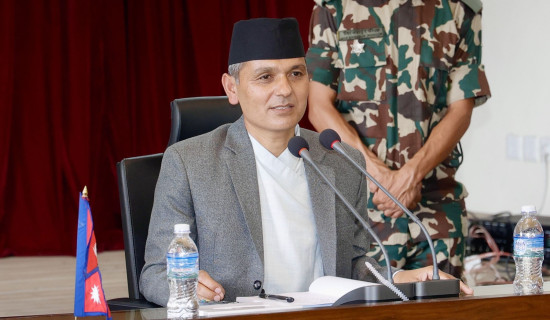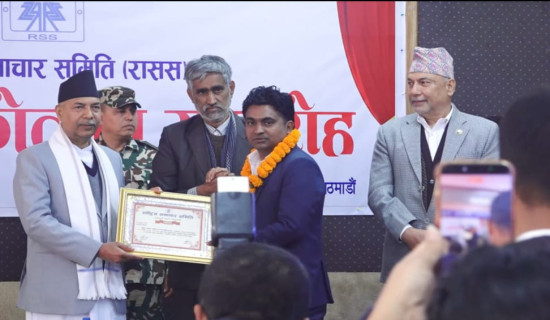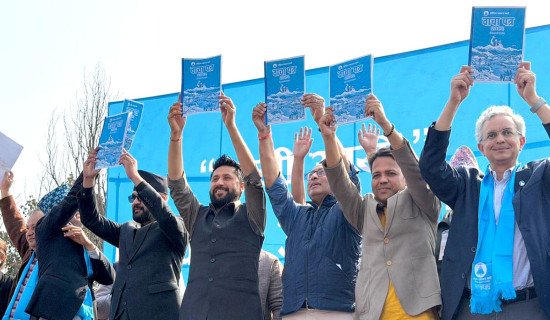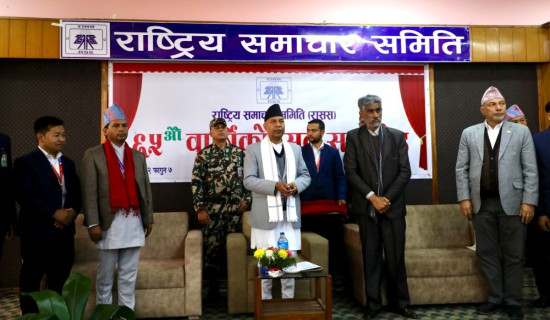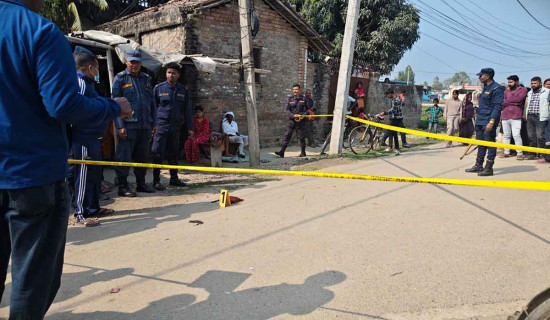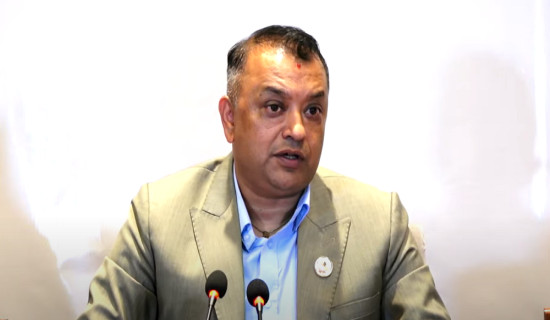- Friday, 20 February 2026
Mahasamiti Conclave : Will It Bolster Congress's Position?
Many Nepali Congress (NC) functionaries and sympathisers have been waiting for the outcome of the highly anticipated Mahasamiti meeting, which began Monday in the picturesque town of Godavari. The three-day meeting of the NC top decision-making body is expected to produce decisions that will not only set the agenda for the country's oldest democratic and largest party in the current parliament, but will also assist the party in bolstering the nation's socioeconomic and political well-being in the coming days. It will assist Congress strengthen its position in ensuring long-term stability, peace, good governance, growth, and prosperity for the country. The conclave must also assist the party in fulfilling its role for institutional growth and federalism and republicanism.
The Mahasamiti meeting, being attended by over 2,100 representatives from across the country, came at a time when the largest party was under fire from various quarters for being plagued by internal strife and failing to devise measures to lift the country out of its current predicament. Many Congress supporters and ordinary citizens believe that conference will help address the pathetic level of political instability, rising corruption, poor law and order, a high rate of unemployment, the exodus of youths to foreign shores, and a failing economy largely based on remittances. Apart from several difficulties facing the party, workers and supporters have chastised the party leadership for playing second fiddle to former rebels in the government while being the largest party in parliament. Attendees in the ongoing conclave are likely to deliberate on these issues and reach conclusions.
Displeasure
Just before the long-awaited conference began, NC officials at the CWC meeting expressed their displeasure with not just three documents to be delivered by vice president Purna Bahadur Khadka, but also two general secretaries, Gagan Thapa and Bishwo Prakash Sharma. The CWC meeting revealed that attendees would make the proposals in the Godavari conclave difficult for the party's top echelon to negotiate.
Many believe that the oldest democratic party, which was at the vanguard of realising, restoring democracy, and leading people's movements to transform the country into a federal republic, is now behaving meekly as a result of coalition politics. NC general secretary Gagan Thapa, who has been tasked with submitting a document on the party's organisational aspects, came out strongly against the party's ideologies and independence being overshadowed by coalition politics.
Thapa rapped party leaders for behaving docilely in front of other coalition partners, arguing that the party should abandon alliance politics and contest all future elections on its own. He even urged that laws prohibiting some parties from contesting elections and creating alliances be implemented immediately. However, general secretary Sharma disputed Thapa, claiming that alliance politics has benefited the NC and the nation by bringing stability to the government, despite internal party divisions. Meanwhile, on the eve of the jamboree, some prominent Congress legislators and leaders pushed the Hindu narrative by launching a larger pro-Hindu campaign. Before the meeting began, they delivered a memorandum to the party president, urging to incorporate a Hindu agenda in the party's statute, which would require the party to strive for the nation's reversion to a Hindu state.
The NC, however, is unlikely to respond positively to this appeal because the coalition partners — the CPN-Maoist Centre and others — as well as the main opposition party, all signatories, and important players in the current constitution do not support it at this time. It is said that a few Congressmen have succumbed to the sway of various interest groups and pro-Hindu elements, who have increased their pressure. It would be interesting if the conclave took up and debated the subject.
There are suggestions that the party reconsider the current electoral system, which prevents any party from becoming the overall winner and forming its own government. Because the provision of electing 40 per cent of legislators through the proportional representation system is linked to hung parliaments, this election system should be changed. No one other than senior leader Shekhar Koirala and his supporters expressed displeasure about such a system and requested that Congress work hard to amend or modify it for the benefit of the multi-party parliamentary system.
Having said that, it is commonly assumed that NC president Sher Bahadur Deuba and his close allies in the party will avoid any requests or proposals that will irritate both coalition partners and the main opposition party. As a result, the party may remain firm in its stance on secularism and the federal republican fabric. Meanwhile, the Congress must deal with the communists' political dominance. Two communist parties — the CPN-UML and the CPN Maoist Centre — have posed significant threats to the party. The party leadership's choice to form and remain in the ruling coalition has allowed the party to maintain its position at the forefront of national politics. The NC will suffer if and when the communists get together to form a unified front. So, General Secretary Thapa's comments and insistence that the NC abandon coalition politics appear ill-advised at the moment.
Cooperation
The cooperation with the Maoist Centre and Janata Samajbadi Party, among others, has kept communists separate, which has benefited the Congress. Thapa nonetheless should be commended for providing certain action plans in his document aimed at organising and improving the political and governance structures. He has advocated that the president be limited to one term, the prime minister to two, the minister to three, and the member of parliament to four. When the same person continues to be the party's leader and is repeatedly assigned major state tasks, other capable members are denied the opportunity, causing bitterness towards the party, political system, and governance system.
Finally, many Congress supporters want the attendees and party leadership to focus on resolving disputes, mistrust, ideological ambiguity within the party, and other gaping issues. They believe that the conclave will succeed in bringing the party together and providing clear guidelines and a future roadmap.
(Upadhyay is former managing editor of this daily.)











